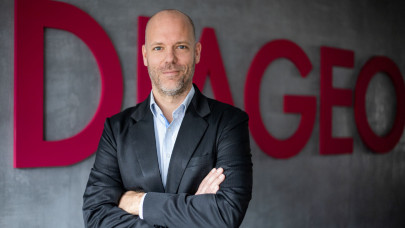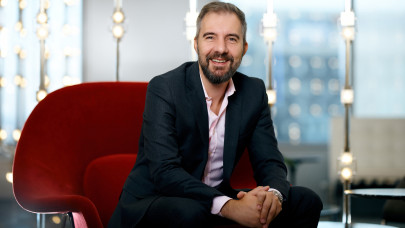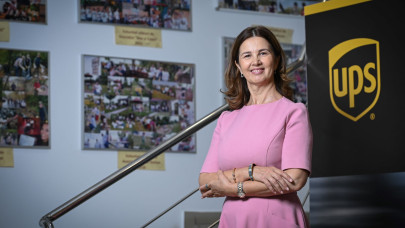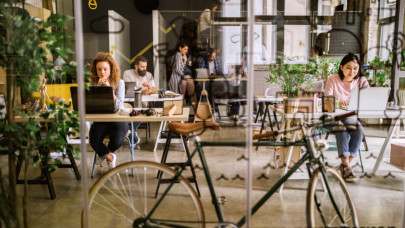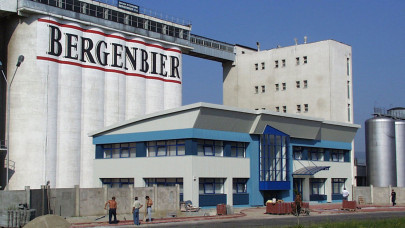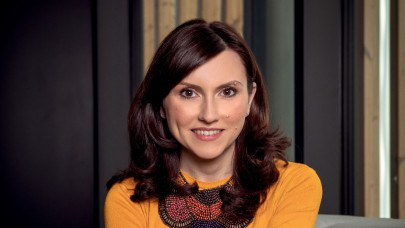What does ESG mean for your company?
Our company's vision is to do business in a way that brings long-term value to the community and the world we live in. Whether we use ESG, corporate responsibility, sustainability, or any other term to define our approach, caring for the impact we have on the environment and people are integrated into every aspect of our operations and supported by solid investments.
Our ESG strategy is reflected in the great focus on reducing our environmental impact, which means cutting emissions, reducing the use of natural resources, as well as tackling the packaging waste challenge. When it comes to social impact, we address both internal and external audiences. We are committed to creating an inclusive and diverse environment inside our company, where everyone's perspective is appreciated and taken into account; we constantly support the professional as well as personal development of our people – whom we like to call our ‘secret ingredient'. At the same time, we are involved in supporting the growth and well-being of the communities where we operate. The Coca-Cola System in Romania develops community projects, in partnership with reputed NGOs, through the sustainability platform ‘After Us'. We aim to make a positive social impact through initiatives supporting youth to achieve their potential, as well as vulnerable segments of the population in achieving professional skills and finding suitable jobs.
Everything starts, however, from the roots of our activity – our products. Our drinks are not only produced to the highest standards of quality and safety, but they come to meet the most diverse needs of consumers. We have many options in our portfolio with zero or fewer calories, small packaging to encourage moderate consumption and different types of packaging – including recycled PET or returnable bottles.
Sustainability for us is about making responsible choices with every step we take. And since it is an integral part of our business, we have created a dedicated sustainability strategy structure within Coca-Cola HBC - the Corporate Affairs & Sustainability department - and a task force led by our General Manager, with sustainability and climate objectives fully integrated into the Group's business strategy.
Tracking progress, learning throughout the process, and improving is essential. To that end, we set ourselves clear goals and monitor results closely. Coca-Cola HBC Romania is the first local company, in the FMCG industry, to produce a sustainability report to international standards and among the first local companies to publicly present such a report.
What measures has the company taken regarding care for the environment, reduced water and energy consumption?
We are taking firm steps on our path to net zero emissions, reducing carbon emissions from direct operations by switching to 100% renewable and clean electricity, replacing refrigeration equipment supplied to customers with energy-efficient coolers, with 50% less energy consumption, while gradually increasing the use of rPET in our packaging portfolio. Packaging is an important piece of this puzzle it is an area where we aim to reduce emissions by using more recycled PET (rPET), as the production of an rPET bottle generates 79% less CO2 emissions than a PET bottle (according to PETRecycling Team, ALPLA Group).
Currently, all our packaging is 100% recyclable, and 20% of our total PET bottled portfolio (the entire Dorna mineral water portfolio) is bottled in rPET. We aim to increase this to 35% by 2025 and 50% by 2030, and the investments we have underway in our Ploiesti plant position us as the first beverage producer in Romania to produce rPET in-house.
Preserving water resources, through sustainable water management, is also a focal point. Water is the main ingredient in the beverages we make. Access to water is fundamental for production activity, but also a vital resource for communities. We carefully monitor water consumption, and our strategy includes clear goals for reducing water consumption and treating wastewater from production processes. Mentioning the progress made in recent years, we recall that from 2017 to 2021, we have reduced our water intensity by more than 6% and we are currently the only beverage manufacturer in Romania with Alliance for Water Stewardship certifications for all 3 of our plants. AWS is the most important certification for companies aiming for efficient water management.
Our efforts are consistent, and we persevere year after year, which also brings us recognition in the industry. Coca-Cola HBC has been confirmed as the most sustainable beverage company in the world, according to the Dow Jones Sustainability Index results in 2022.
What are the company's current sustainability targets?
Our main targets are focused on the environmental area, where we aim to make impactful progress in the coming years. We have committed to reduce our emissions to net zero by 2040, through our NetZeroby40 strategy. We started to walk on this path long before we announced this commitment and it is also a long-term process, that we cannot complete alone, but together with our partners. Investments are complex and cover various areas of sustainability action. For example, by 2025, at the level of the entire Coca-Cola HBC group, we have planned investments of €250 million in initiatives to reduce emissions.
Sustainable packaging management is also essential to our business, as part of our plan to reduce emissions as well as tackle the packaging waste challenge that the world is facing. We have specific targets in this area, set through our strategy - A World Without Waste (WWW): by 2030, we aim to support the collection and recycling of an amount of packaging equivalent to 100% of what we put on the market. Moreover, we aim to gradually increase the recycled material in our packaging, reaching 50% by 2030.
Our strategy, A World Without Waste, is built on the principles of the circular economy and involves initiatives aimed at the entire life cycle of a package - from design to collection and recycling - supported by complex investments. We are making important progress locally on the path to achieving our targets. All packaging put on the market in Romania by the Coca-Cola System is 100% recyclable and 20% of the total portfolio bottled in PET is recycled PET. We have implemented in Romania other pioneering initiatives, as well, in order to reduce the material used for packaging. In 2021, with an investment of €2 million, the Coca-Cola Romania System launched, for the first time on the local market, Keel Clip, a collective packaging made of biodegradable and recyclable cardboard for cans, which helps to reduce by approximately 200 tons per year of the amount of plastic in foils. In addition, we are on track to begin our in-house production of rPET, in our plant in Ploiesti, following the completion of a major investment project. This will allow us to extend the use of recycled PET packaging in our portfolio.
Not least, at the beginning of this year, The Coca-Cola System in Romania took another step towards A World Without Waste by introducing bottle caps that stay attached to plastic recipients. The initiative is part of our ongoing transition to meet the provisions on closures of plastic beverage containers in the EU Directive on Single-use Plastics. It is intended to boost the collection and recycling of plastic bottle caps – together with the bottles – to help reduce packaging waste.
Can you tell us about the partners you're working with to reduce your carbon footprint?
This is an important aspect, as collaboration with our partners is a key element to ensure we make solid progress on the path to our net zero targets. We act on several pillars and whether it is about using more recycled material in our packaging, using more energy-efficient refrigerating equipment, or transportation, we rely on our suppliers, distributors, and commercial partners to join our efforts. We like to look at sustainability as a team effort and we choose to work with partners who share our vision and goals.
What percentage of your suppliers are local?
For 32 years, we have been building more than just a successful business in Romania: we are a trusted partner to the business sector and the community, committed to making a positive impact on the local economy. Since entering the Romanian market, we have built a business model based on collaboration with local partners. Our activity engages an entire economic network, and it has a positive impact throughout our entire value chain. Currently, 85% of The Coca-Cola System's suppliers in Romania are local companies, from which we source labels, raw materials, packaging, materials, technology, and equipment, as well as services such as consultancy, communication, and marketing. Our collaboration generates what we call the „upstream” impact of our activity – €141 million in added value consisting of taxes, salaries, and profits related to Coca-Cola System's suppliers and their suppliers, as well as an important number of jobs in these companies, which relate to our activity.
How is the retail industry doing in achieving sustainability goals compared to other industries in Romania?
Sustainability is growing in importance among all industries and is also becoming an area subject to more regulations, whether local or European. In this context, many industries are shaping their strategies to become more sustainable and accelerating their actions, with some of them having more consistent progress. I believe the retail segment is on a good path – it's a segment with strong players that have been implementing sustainability strategies for a long time, as well as a segment where collaboration between different players had led to great results. I am talking about the upcoming implementation of the Deposit-Return System - a project that has the potential to change Romania in regard to how we treat our packaging and the waste resulting from it. The development of this project has involved common efforts from associations of beverage manufacturers and retailers. Together - beverage producers, retailers, and consumers - we will collect and subsequently recycle beverage packaging placed on the market, taking important steps towards an effective circular economy.
Coca-Cola HBC Romania, as a member of the Soft Drinks Manufacturers Association, is one of the companies involved from the beginning in the efforts to implement the Deposit-Return Scheme. In 2022, we reached the operational phase by licensing RetuRO, the company that manages DRS, and with the steps taken so far, we are confident that the implementation will be successful this year.
Besides the 'E' (environmental), social (S) is also an important component of ESG. What's your company's approach to the ‘S'? What social initiatives were the company and its employees involved in in 2022 and what programs do you have planned this year?
We are part of the local community in which we operate, we feel very connected to it and we believe it has an amazing potential, that we want to support. We continue to contribute to a change for the better under the sustainability platform of the Coca-Cola System in Romania, ‘After Us'. We run projects aimed at supporting youth, social entrepreneurs, and vulnerable segments of the population, through which we aim to have a positive social impact in communities. To mention some of the most recent integrated numbers available - in 2021, for example, we supported 7,336 young Romanians with personal and professional development training courses, through our "Youth Empowered" program, and helped more than 860 people who had lost their job during the pandemic to find a new path, through our program, "Working again". We continue to work closely with our partners in the non-governmental field in assessing the most pressing needs in our communities and how we can make the strongest impact, through all the resources we can provide - from human capabilities to financial support.


